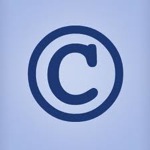
Received this email from Susan. Would that her idea could come about! (blockquotes omitted)
Hi Paul,
I spent a few hours today constructing a copyright page that I would like to share with your readers. As you can probably tell, I am in the process of writing a book. It will be over 400 pages and published as both a paper edition with a DVD and a PDF with embedded videos, hyperlinks, zoomable images and all that cool stuff you can do with electronic media.
After perusing standard copyright pages, I decided that they were all at odds with my personal philosophy and decided to write my own version. Here it is.
Human Copyright for the 21st Century
With the exception of a few pictures that are in the public domain, almost everything in this book is under copyright. When something is copyrighted, it means that it belongs to someone else. In this instance, unless specifically acknowledged otherwise, all the words and images are under copyright by me, the author. However, it’s my firm belief that information is meant to be shared, not bound by legal stricture. I really resent blanket copyright declarations that forbid the readers from using or reformatting the knowledge in any meaningful way. Thus, I’ve devised my very own copyright permission page that spells out what you, the reader, may do with the contents herein.
You may scan, print, copy, or otherwise convert the contents to other formats in any way you wish, as long as your purpose is entirely personal. You can, for example, make backup copies of the DVD, output the contents to your printer, transfer the DVD to your hard drive, or paint excerpts on the back of your pet gerbil. You need no permission from me to do so.
You may share an excerpt for non-commercial purposes, for example, to help a friend, incorporate into a blog post, or contribute to a private group, without my express permission. Please do give credit, however. The credit line should read: Photo/text/video courtesy of Susan Stevens, used with permission. In the cases where the photos or text are the property of someone else, you will need to contact them directly to arrange permissions.
You may not share any part of this book for commercial purposes without permission and remuneration. If you are teaching a class, I expect some form of payment as well as credit, because in these instances, I am the teacher standing behind you as you instruct the class. A Starbuck gift card, an Amazon credit, or a small donation to Paypal is not too much to ask, considering the time that I’ve spent assembling this missive. Again, in the cases where the photos or text are the property of someone else, you will need to contact them directly to arrange terms.
If you are an ongoing commercial enterprise, for example, a magazine, other arrangements will have to be made. In these cases, I expect fair payment commensurate with your other contributors. Please pm my Ravelry name, fleegle, to discuss terms and conditions.
There are no reserved foreign rights. We are all of one world, thanks to the Internet.
I have made arrangements for this book to be put in the public domain after my death for use by anyone and everyone under all circumstances. I refuse to sequester the information in the name of copyright when I am no longer around to benefit from it.
Although this copyright page is copyrighted (see Department of Redundancy Department), I herein give express permission for it to be reused in any format by anyone who shares the same information philosophy I do. If you intend to use this page as an example of How Not to Write a Copyright Statement, the reprint and excerpt fee is One Million US Dollars. And I will pursue you legally if I find out about it.
If you have any questions or concerns, please pm my Ravelry name, fleegle, and I will be happy to address them to the best of my ability.
H Paul–
I forgot to add that, although the copyright page I sent you is copyrighted by me (see Department of Redundancy Department), I give express and complete permission for the contents to be reused in any form by anyone who shares the same philosophy I do about information. I hope authors who read your column will take it to heart.
Thanks!






























Isn’t this just more or less CC-BY-NC?
“However, it’s my firm belief that information is meant to be shared, not bound by legal stricture.”
That seems to be in direct conflict with:
“If you are teaching a class, I expect some form of payment as well as credit, because in these instances, I am the teacher standing behind you as you instruct the class.”
Traditionally, teaching is considered one of the higher forms of “sharing information” and has more “fair use” precedents in existing copyright laws then just about any other subject. In particular, being able to freely excerpt parts for education seems almost necessary in a copyright system. Obviously using the material wholesale would be going to far, but as written I think this “human copyright” has gone to far in the other direction.
In the craft world, it’s common practice to copy patterns and directions wholesale, and teach an entire class without giving any credit to the designer. Or say something like “I found this on the Internet.” Another book of mine, about embroidery, is commonly copied in its entirely and sold as as set of rubber-banded pages. Excerpts are handed out to the students without a qualm. Unfortunately, I am helpless to do anything about it, because the legal fees make it not worth pursuing.
I am trying to discourage such practices by reminding the teacher that, if they wish to earn money using my techniques, research, or patterns, they are using something that doesn’t belong to them. It’s unlikely that anyone would actually remunerate me, but a gentle reminder might make them feel a little guilty. Maybe.
Nice!
One of the things that makes me sceptical about self-publishing as some sort of saviour (or, I admit, any DRM-free publisher I’ve bought from), is that nobody takes copyright licenses at face value.
There’s a culture that assumes a) US-style fair use rights will let me do what I need to use the product; b) if they don’t, I should go ahead anyway because it’d be practically impossible to sue me.
I suppose most practical-minded people are happy not to think about it. I do think about it, and I’m not happy. I hope this post makes a few people think, and consider adjusting their copyright notices.
I like the whole going-into-public-domain-after-I-die thing but requiring remuneration if you use material in a class violates Fair Use (provided that the amount of material used does not constitute the whole/substantial part of work and the work is properly attributed). The bit about not being able to criticize it without paying a fee is also a violation of Fair Use. Perhaps I’ll even write a satire to illustrate the point.
Oh come on. Explained why I put those clauses in there. Wholesale copying of chapters and handing them out to students doesn’t constitute fair use. If a teacher said she wanted to excerpt a few paragraphs, I would let her do it for free.
And the other clause was a joke. Lighten up.
Actually, according to http://home.earthlink.net/~cnew/research.htm copying a chapter can be considered fair use, under the right circumstances (the chapter itself is brief, the material is not used repeatedly, etc.). As for a few paragraphs, whether you would ‘let her do it’ is irrelevant. She has the right to do so regardless of what you think. Copyright is a legally granted monopoly that is offered by governments in exchange for a quid pro quo in the form of fair use. It is not ‘property’ in the traditional sense, no matter what lobbyists and oligarchs may claim.
According to this, you are wrong.
The fourth factor measures the effect that the allegedly infringing use has had on the copyright owner’s ability to exploit his or her original work. The court not only investigates whether the defendant’s specific use of the work has significantly harmed the copyright owner’s market, but also whether such uses in general, if widespread, would harm the potential market of the original. The burden of proof here rests not on the defendant for commercial uses, but on the copyright owner for noncommercial uses.
In the case of a teacher copying my chapters so the students don’t have to buy the book, that clearly harms my ability to make money from the work. I can point, for example, to losses amounting to about $25,000 from my first book, which sells for $100 and at last count, 250 people didn’t buy it because the teachers copied the chapters and handed them out as part of the class cost. In these cases, the teacher is making money off of my intellectual property, and I’m sorry. That’s just wrong.
Not going to argue with you. I had a copyright lawyer look at it, and she said it was brilliant.
Actually, I am correct. You simply didn’t read what I wrote carefully enough. I wrote that “copying a chapter can be considered fair use, under the right circumstances.” The text clearly supports this (look at the chart towards the bottom of the page, for example). The example that you give is simply a case of different circumstances and your attempt to use to refute my statement is a clear example of the straw man fallacy. You may have had this incident in mind when you were writing, but your actual statements were general (“Wholesale copying of chapters and handing them out to students”). If a chapter, for example, consisted of a page, was used once in class (and not semester after semester, for example), and was spontaneous, it would be fair use for the teacher to copy that chapter and hand it out to students, according to the above source. You should be more specific to avoid falling afoul of the straw man fallacy (i.e. attributing to another an argument that they are not in fact making). As a secondary note, while the example you give is clearly a violation of copyright, the idea that a copied chapter(s) of a book equals a lost sale is clearly fallacious. A certain percentage of those receiving the hand outs would not have bought your book ($100? Yikes!) anyway.